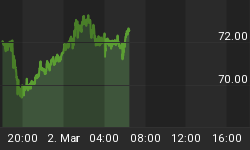The International Monetary Fund (IMF) has downgraded its global growth forecast for both this year and next, highlighting among other things, the threat of weakening demand in the Eurozone and a slide into deflation. This comes after consumer price growth in the euro zone slipped again in September, coming in at just 0.3 percent.
There's absolutely no sign of growth in the Euro region. France is stagnant, Italy is back in recession, and even the German economy, once the pillar of the Eurozone, shrank in the second quarter. German industrial output fell by 4 percent in August, with the worse-than-expected drop coming a day after the country's industrial orders had their largest monthly decline since the global financial crisis in 2009.
The United Kingdom isn't fairing any better, as manufacturing output for August grew just 0.1 per cent, down from 0.3 per cent in July.
And then of course we have Japan, whose industrial production shrank 1.5 percent month-on-month in August and spending among Japanese households fell a steeper-than-expected 4.7 percent.
Life in the emerging markets isn't faring much better. Adding to the world-wide misery is Russia. Russia is suffering from its involvement in the Ukraine, resulting with both U.S. and European Union imposed sanctions. Investors are now frantically pulling money out of the country. Demand for dollars and euros is growing among Russian companies locked out of western debt markets as they contend with $54.7 billion of debt repayments in the next three months; leaving the rubble under severe pressure. All this is exacerbated by the plunge in oil prices to their lowest level in more than two years--threatening to tilt the $2 trillion Russian economy further towards recession.
Moving to the other side of the globe, we have Latin American economies that are also in, or teetering on recession. Brazil's economy, post-world cup, is on life support, its one hope being that President Rousseff, the Marxist and former guerilla, doesn't win the election. A win for her seems likely, even though Brazil's economy is officially in recession. The second quarter's GDP took a huge downturn, contracting 0.6 percent from the first quarter.
Chile's manufacturing output fell 4.9 percent in August, as policy makers cut their growth forecast for the 4th consecutive quarter. And, it may finally be time to cry for Argentina, as tougher controls on trade and the currency market are exacerbating economic imbalances that were already dizzied from the nation's July default. Economists now predict the first full-year recession in Latin America's No. 3 economy in over a decade.
And then of course we have China, the former darling of global growth. Its industrial production growth slowed sharply in August to its lowest level for more than five years. In addition to this, house prices have fallen for five consecutive months. This could be a result of China's large debt-to-GDP ratio, which stands at 217 percent. The Chinese government continues to add to their debt load by fruitlessly attempting to stimulate the economy through endless construction projects. But all they have produced are more unoccupied cities, instead of balanced and sustainable growth.
The fact is that economies all over the world are in, or near a recession. However, Wall Street's greed and hubris is trying to convince investors to believe U.S. growth will be immune from the global malaise and leave the earnings of multinational corporations unaffected.
But why would the growth rate of earnings and the US economy be better than virtually every other country on the planet? Linear-thinking economists are extrapolating the Q2 GDP rebound from the negative first quarter as a sustainable trend. But a temporary bounce from a sharply negative 1st quarter should not be viewed as a permanent growth trajectory. The entire planet is suffering from anemic growth due to a tremendous debt albatross. That includes the United States.
To think Q3's earnings won't be disappointing, investors have to believe that; weak and faltering global growth, a surging U.S. dollar, the Fed ending a $1.7 trillion QE III program, and the specter of rising interest rates in 2015, will be great news for multinational corporate earnings.
The United States is part of a global economy and does not operate on an economic island. Now that the Fed's QE programs are ending, global deflation is starting to take over. Equities, bond yields, commodities and home prices are all starting to roll over. Look for these factors to negatively impact S&P 500 earnings in significant fashion this quarter.
















